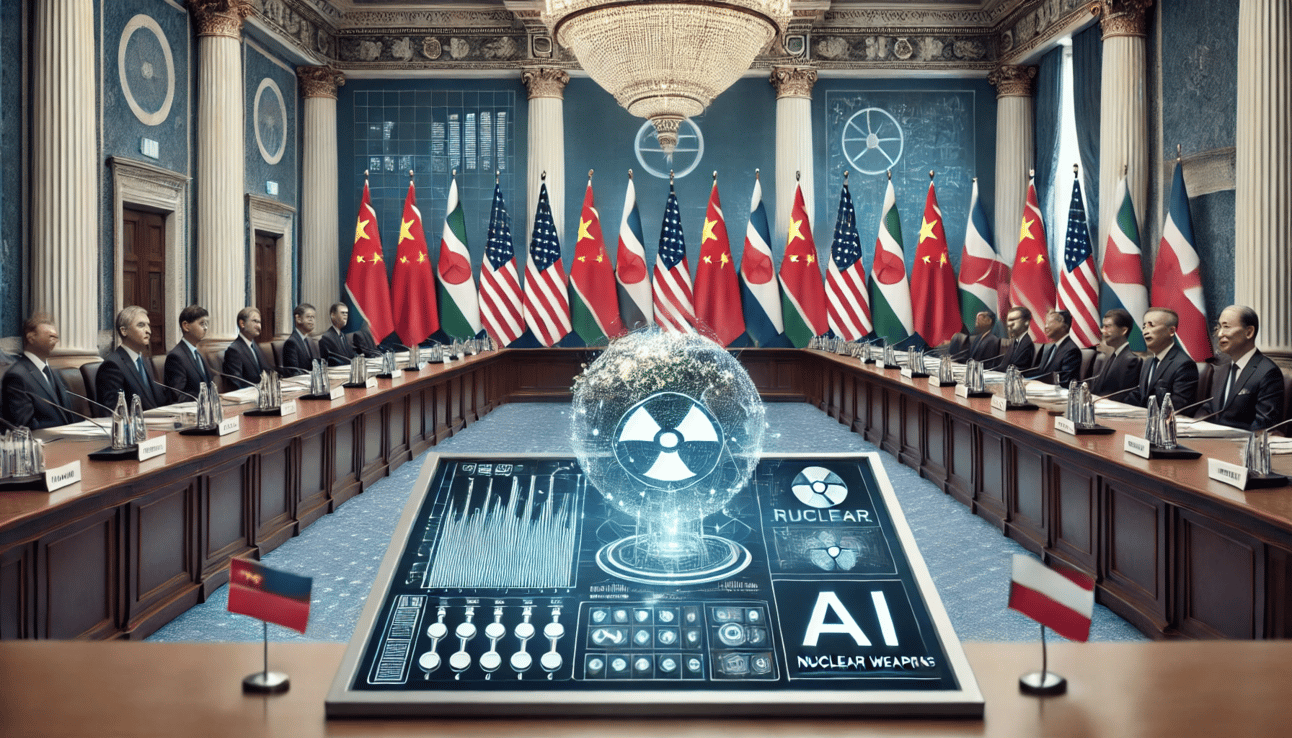
Image Source: ChatGPT-4o
China Declines AI Control Ban On Nuclear Weapons At Global Summit
In a surprising move, China has decided not to sign the ‘Blueprint for Action’ agreement, a global initiative aimed at preventing the use of artificial intelligence in controlling nuclear weapons. The non-binding agreement was initially supported by more than 100 nations, including the U.S. and Ukraine, at the Responsible AI in the Military Domain (REAIM) summit held in Seoul. The agreement’s key principle emphasized that decisions regarding nuclear weapons should remain in human hands, not those of AI systems. This initiative describes itself as the "most comprehensive and inclusive platform."
Seoul Summit: A Collaborative Approach
The Seoul summit, co-hosted by the Netherlands, Singapore, Kenya, and the UK, emphasized the importance of multi-stakeholder discussions to ensure that no single country dominates the conversation on AI in military applications.
Russia’s Exclusion and China’s Withdrawal
Russia was not invited to the summit due to its ongoing war in Ukraine. While many nations agreed to the proposal, reports indicate that China refused to endorse the agreement, despite its focus on maintaining human control over nuclear weapons-related decisions. The guidelines stressed that AI in the military should align with national and international laws and be applied in an ethical, human-centric manner.
Lack of Penalties for Violations
The summit’s two-day discussions did not establish penalties or sanctions for violations of the guidelines. Though progress was made, leaders acknowledged that more conversations would be needed to develop policies that can keep up with AI’s rapid evolution in military applications.
AI in Military: A ‘Double-Edged Sword’
The summit, co-hosted by South Korea, saw Defence Minister Kim Yong-Hyun refer to AI as a “double-edged sword” in the military domain. While AI has the potential to enhance military capabilities, he warned of the risks of misuse and abuse.
A Global Effort for Responsible AI Use
The ‘Blueprint for Action’ represents a growing international concern over the militarization of AI. Around 60 countries, including the U.S., have agreed to adopt responsible AI practices on the battlefield. The guidelines call for strict human oversight in AI deployment and emphasize the importance of ethical and controlled applications in military settings.
Focusing on Weapon Control and AI-Enabled Drones
The Dutch government highlighted real-world examples, such as AI-enabled drones being used by Ukraine, to illustrate the urgency of developing these guidelines. The document also addresses the prevention of AI-driven weapons of mass destruction from being developed or deployed by rogue entities, including terrorist organizations.
Ukraine and NATO Countries Sign the Agreement
Ukraine, along with NATO members like France, Germany, the UK, and the U.S., endorsed the guidelines. However, Russia’s ongoing conflict with Ukraine led to its exclusion from both the summit and the agreement.
REAIM Summit: Building on Past Efforts
This year’s REAIM summit is the second of its kind, following last year’s gathering in The Hague. At that time, China joined in signing a ‘call to action,’ though it lacked legal obligations. In contrast, this year’s summit aimed to take more concrete steps toward responsible AI use in military settings.
Cautious Progress Towards Global Consensus
While some progress has been made, experts like Giacomo Persi Paoli of the United Nations Institute for Disarmament Research warn against moving too quickly. He stressed that pushing forward with rules too soon might discourage nations from participating. The ‘Blueprint for Action’ represents a gradual step toward establishing global guidelines on AI in military operations.
"We are making further concrete steps," Netherlands Defense Minister Ruben Brekelmans told the Reuters news agency. "Last year ... was more about creating shared understanding, now we are getting more towards action."
"We also need to be realistic that we will never have the whole world on board," Brekelmans said, in response to the number of states that did not sign.
Ongoing U.S. Initiatives
The U.S. government has also been actively working on responsible AI use in the military, having launched its own declaration last year. These efforts highlight a broader international push to ensure that AI development in the military adheres to ethical standards.
Global Tensions Rise as China Rejects AI-Control Ban on Nuclear Weapons
The refusal by China to sign the ‘Blueprint for Action’ agreement highlights a growing divide in global governance of AI in military applications. As nations grapple with the ethical and strategic implications of AI-driven warfare, this summit underscores the urgent need for international cooperation to ensure that advancements in AI technology remain under human control, particularly when it comes to weapons of mass destruction.
